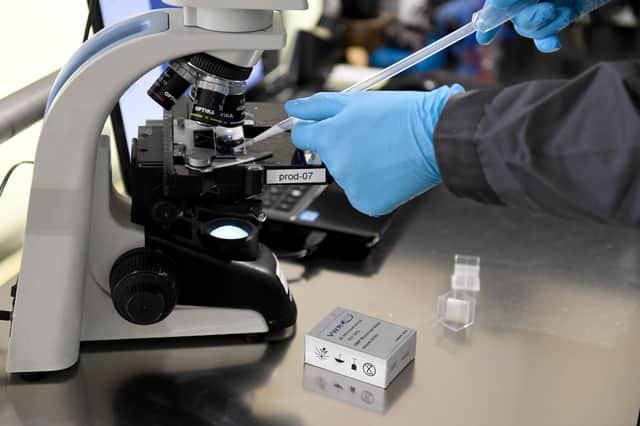Scientists have developed a prototype mask which can diagnose Covid in 90 minutes


Scientists have created a prototype face mask which can accurately diagnose Covid or other diseases after being worn for just 90 minutes.
Scientists at the Massachusetts Institute of Technology (MIT) and Harvard University created the mask, which contains small, disposable sensors developed using freeze-dried cellular machinery, which target specific molecules.
At a glance: 5 key points
Advertisement
Hide AdAdvertisement
Hide Ad– They masks work by releasing a small reservoir of water when the wearer pushes a button to perform the test, with the sensor analysing droplets from the wearer's breath to detect whether there are any Covid particles.
– They can also be used to detect other diseases, including influenza, Ebola, and Zika, or the presence of nerve agents
– Researchers claim the masks are are effective as accurate as PCR tests, but as fast as antigen tests
– The masks are designed so that the sensors can be switched on when the user wants to use them, with the results of the test displayed internally, for privacy reasons
Advertisement
Hide AdAdvertisement
Hide Ad– The scientists have also demonstrated that it is possible for the sensors to be embedded into other items, such as lab coats, to help monitor researchers’ exposure to dangerous substances or pathogens
What’s been said?
Peter Nguyen, a research scientist at Harvard University’s Wyss Institute for Biologically Inspired Engineering, said: “This test is as sensitive as the gold standard, highly sensitive PCR tests, but it’s as fast as the antigen tests that are used for quick analysis of Covid-19
Luis Soenksen, a Venture Builder at MIT’s Abdul Latif Jameel Clinic for Machine Learning in Health, said they developed the masks having, “essentially shrunk down the functionality of state-of-the-art molecular testing facilities into a format compatible with wearable scenarios across a variety of applications”.
Professor James Collins, the Termeer Professor of Medical Engineering and Science in MIT’s Institute for Medical Engineering and Science (IMES) and Department of Biological Engineering, said: “We've demonstrated that we can freeze-dry a broad range of synthetic biology sensors to detect viral or bacterial nucleic acids, as well as toxic chemicals, including nerve toxins.
"We envision that this platform could enable next-generation wearable biosensors for first responders, health care personnel, and military personnel.”